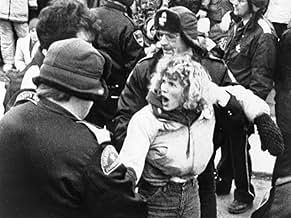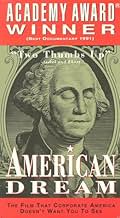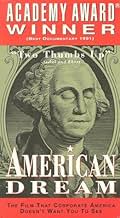IMDb RATING
7.8/10
1.1K
YOUR RATING
Recounts the 1985-86 strike against the Hormel Foods Corporation in Minnesota after its employees' wages and benefits were cut.Recounts the 1985-86 strike against the Hormel Foods Corporation in Minnesota after its employees' wages and benefits were cut.Recounts the 1985-86 strike against the Hormel Foods Corporation in Minnesota after its employees' wages and benefits were cut.
- Won 1 Oscar
- 12 wins & 3 nominations total
Dan Rather
- Self
- (archive footage)
Ronald Reagan
- Self
- (archive footage)
Featured reviews
the most obvious parallel is michael moore's "roger & me." both films look at one community dealing with a corporation's decision to either cut the work force (roger and me) or drastically cut its wages (american dream). michael moore interjects himself into his films a great deal - he is in front of the camera, he uses voice-overs - instead of intertitles - to fill in needed information, etc. some think this is to his detriment, but i think it is honesty...he clearly acknowledges that there is an author and that's a good thing. american dream, on the other hand, attempts to appear objective by choosing to use intertitles and keeping the filmmakers behind the camera. the storytelling and pacing of this film isn't as good as that of "roger and me," but when it comes to documentaries there is room for error in these areas. documentaries ultimately, at least for me, are judged primarily on the story they tell, more than how well they tell it; and i think that's less true for feature films. this film tells a good story. through the film we are able to see the entire process a union undertakes when they have a dispute. if you don't know much about unions then this is a great place to start. if you hate corporations then this will fuel your fire. if you like good documentaries then add this to your list. B.
This Oscar-winning 1991 documentary is captivating, personal, and heartfelt. It is also, however, a bleak and dark film, and the vantage it provides into American capitalism is a haunting one. Much like Kopple's previous documentary: "Harlan County, U.S.A.," "American Dream" is more than an examination of a labor dispute. (Specifically, the 1984 strike of Hormel, Inc. meatpackers in Minnesota). This film asks that we look at the bigger picture, and it was made during a time when the American economy was faltering. Through her frank and journalistic interactions with various stakeholders, Kopple presents a riveting deconstruction of the working class in America, as well as big business and the interworkings of organized labor. Underneath it all, though, this is a human interest story, and watching the strike unfold chronologically - from various viewpoints - is magnetizing. Brother is pitted against brother, union against union, and Kopple's delicate political handling is masterful. Anyone interested in organized labor in America, as well as the sometimes fleeting notion of the American Dream, this is one you SHOULD NOT MISS. This is gripping, psyche-dwelling stuff. (PS: During the film's closing credits, take note of the huge amount of organizations and people who contributed their money, and volunteeered their talent to this project. Perhaps nothing else is greater testament to its importance). ---|--- Was this review helpful?
10jgtoms
This film is absolutely stunning. It centers around union meatpacking workers at a Hormel plant in Austin, Minnesota in the mid-80's. The trouble started when Hormel cut worker pay from $10.69 an hour to $8.25 an hour. The problem? Hormel had just posted a net profit of $30 million. As one worker at a union meeting put it, "If we have to take a cut of $2.45 an hour when the company just made $30 million, I hate to think of what's gonna happen when they actually post a loss." With no help from their parent union, International Food and Commercial Workers Union, the local union (P-9) goes on strike alone trying to bring Hormel to its knees. Director Barbara Kopple, who also made the great "Harlan County, USA", does an outstanding job of capturing every important moment. She has the camera there at every union meeting, press release, Hormel press release, etc. She also shows the very personal aspects of a strike going into people's homes and showing their innermost feelings about what's going on. In the end, the strike is long, drawn out, and things appear bleak. The constant Minnesota cold, snow and ice are always in the background as well. If one doesn't have a greater appreciation for unions and what they have to sometimes endure after watching this film, he/she probably didn't pay very good attention.
It may at times resemble an illustrated Bruce Springsteen protest ballad, but the tragedy in Barbara Kopple's Oscar winning documentary portrait of a Minnesota meat packer's strike is too rich to ignore, not unlike the film 'Roger & Me' but without Michael Moore's self-serving humor. The story begins in the mid 1980s, when the Hormel Company in Austin, Minnesota, tried to lower wages despite showing a healthy profit, leading members of Local P-9 to ignore their parent Union and hire an rhetoric spouting outside agitator (labor 'consultant' Ray Rogers), who transformed their grievance into a noble but ultimately self-defeating grassroots crusade. Kopple herself remains more or less invisible throughout the film, but her sympathy for the renegade P-9 underdogs (and her anti-Reaganomics attitude) is obvious, and she reveals the personal and civic consequences of labor disunion with heartbreaking clarity. The strike itself may not have made headlines outside the Mid West, but the story has some devastating implications for organized labor nationwide, and beyond that supplies enough drama and character to match any Hollywood blockbuster.
I was raised in a beef slaughtering plant family in Northeastern Colorado. My father was a member of UFCW Local 7 for many years as well as my brothers and my mother. Watching this movie brought back memories of how life was during strike time. I will hand it to Kopple, about catching the true realities of a plant family on strike. The scenes of the negotiation teams and plant management were excellent, since I didn't get to see what happens behind closed doors, there were guys that told me, but it really hits home when you see it. The scenes of the slaughter, even though my family worked in beef plant and this was a hog plant, I could hear the noise and smell the smells and oddly enough, it was like being back home. This movie brought some tears to my eyes and some bittersweet memories...please e-mail if you have any questions about what life is like on strike...
Did you know
- How long is American Dream?Powered by Alexa
Details
- Release date
- Countries of origin
- Official site
- Language
- Also known as
- Американская мечта
- Filming locations
- Production companies
- See more company credits at IMDbPro
Box office
- Gross US & Canada
- $269,823
- Opening weekend US & Canada
- $9,291
- Mar 22, 1992
- Gross worldwide
- $269,823
Contribute to this page
Suggest an edit or add missing content






















